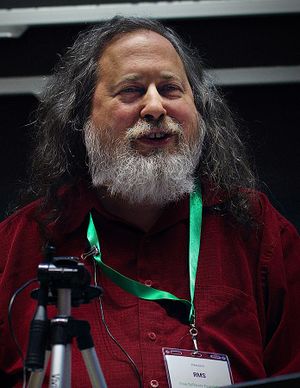Richard Stallman
( activist, hacker, programmer) | |
|---|---|
 | |
| Born | 16 March 1953 New York City |
| Nationality | US |
| Alma mater | • Harvard University • Massachusetts Institute of Technology |
| Founder of | GNU |
US activist hacker whose work who started GNU which led to Linux | |
Richard Matthew Stallman (RMS) is an American free software activist and programmer who founded GNU which was instrumental in the development of GNU/Linux in the 1990s. RMS campaigns for software to be distributed in a manner such that its users receive the freedoms to use, study, distribute, and modify that software. Software that ensures these freedoms is termed free software.[1]
GNU Project
Richard Stallman launched the GNU Project in September 1983 to create a Unix-like computer operating system composed entirely of free software. With this, he also launched the free software movement. He has been the GNU Project's lead architect and organiser, and developed a number of pieces of widely used GNU software including, among others, the GNU Compiler Collection, GNU Debugger, and GNU Emacs text editor. In October 1985, he founded the Free Software Foundation (FSF). In September 2019, he resigned as president of the FSF and left his "visiting scientist" role at MIT.[2] Stallman remains head of the GNU Project.[3]
Copyleft
Richard Stallman pioneered the concept of copyleft, which uses the principles of copyright law to preserve the right to use, modify, and distribute free software, and is the main author of free software licenses which describe those terms, most notably the GNU Project's General Public License (GPL), the most widely used free software license.
In 1989, RMS co-founded the League for Programming Freedom. Since the mid-1990s, Stallman has spent most of his time advocating for free software, as well as campaigning against software patents, digital rights management (which he referred to as digital restrictions management, calling the more common term misleading), and other legal and technical systems which he sees as taking away users' freedoms. This has included software license agreements, non-disclosure agreements, activation keys, dongles, copy restriction, proprietary formats, and binary executables without source code.[4]
A Quote by Richard Stallman
| Page | Quote |
|---|---|
| Document:Huawei Hypocrisy | “Richard M Stallman: Well, it’s perfectly reasonable suspicion to me. I don’t think the US government should use operating systems made in China for the same reason that most governments shouldn’t use operating systems made in the US and in fact we just got proof since Microsoft is now known to be telling the NSA about bugs in Windows before it fixes them.
Roy S Schestowitz: I was just going to bring this up exactly, so I was saying that the NSA recently received notifications about the zero-day holes in advance and [incomprehensible] the NSA and the CIA to just crack PCs abroad for espionage purposes. Richard Stallman: Now, [incomprehensible] that this proves my point, which is that you have to be nuts if you were some other country and using Windows on your computers. But, you know, given that Windows has a universal back door in it, Microsoft would hardly need to tell the NSA about any bugs, it can tell the NSA about the mal-feature of the universal back door and that would be enough for the NSA to attack any computer running Windows, which unfortunately is a large fraction of them.” |
Related Document
| Title | Type | Publication date | Author(s) | Description |
|---|---|---|---|---|
| Document:People Need to Reclaim the Internet | blog post | 19 October 2020 | Craig Murray | The development of social media gatekeeping of internet traffic is one of the key socio-political issues of our time. We need the original founders of the Internet to get together with figures like Richard Stallman and – vitally – Julian Assange – to find a way we break free from this. |
References
Wikipedia is not affiliated with Wikispooks. Original page source here